Feb 3, 2025 – Travel from India to Bhutan
Hello. Today, we flew from Bodh Gaya, India to Paro, Bhutan, and then drove for 10 hours to reach Nabji Chiwog in Trongsa.
After completing morning practice and meditation, Sunim had a barugongyang (formal Buddhist monastic meal) with the members of the Sangha.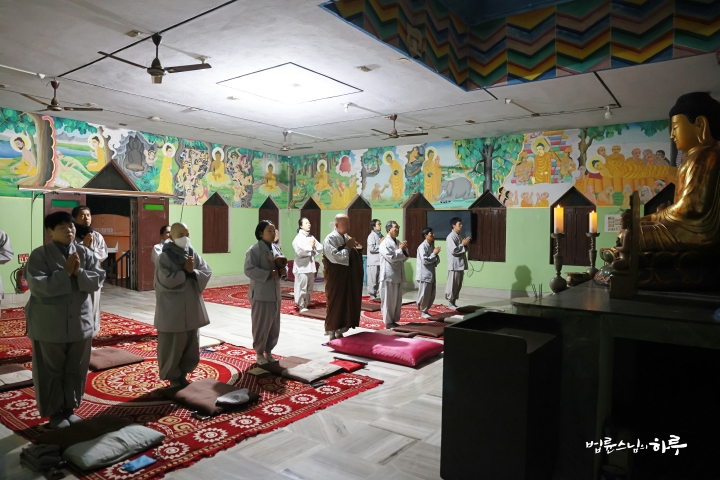
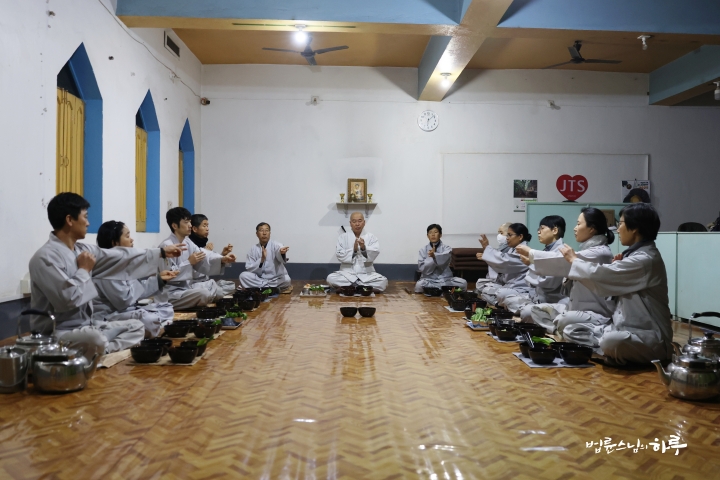
Some volunteers were still in the Indian community to wrap up the pilgrimage. Sunim checked in on their health conditions and future travel plans before saying goodbye.
“I’m leaving for Bhutan today. Take care of your health, everyone, and let’s meet again next year.”
After the barugongyang, Sunim prepared his things for the journey to Bhutan. Today is a holiday in India commemorating the god of education, so Sujata Academy is closed. As the children had the day off from school, the JTS center was quieter than usual. After saying goodbye to the members of the Indian community, we departed from Sujata Academy at 8:30 AM.
In the car, Sunim discussed JTS operational policies with Dharma Teacher Bogwang.
“If someone volunteering at JTS wants to make a lot of money, no matter how talented they are, it’s difficult to work together in the long term.
However, we must ensure that volunteers can maintain a basic standard of living. For example, if staff members need to buy groceries, JTS should at least provide rice so they can have it without any burden. Also, if villagers all have houses, but our staff can’t afford to build one, we should provide materials for house construction. If education costs for children are burdensome, we can utilize the system where Sujata Academy provides free educationup to middle school. When providing such support, all processes should be formalized.
Staff members should be able to live and volunteer at the school and JTS until their 30s, and we need to prepare so that they can maintain their lifestyle in their 40s when they need to send their children to college or get them married. To do this, we need to examine what needs to be systematically prepared.”
Sunim recalled a recent meeting where a staff member shared the difficulties they face while volunteering. Even until just before leaving for Bhutan, Sunim was contemplating how to improve the welfare of the staff.
Upon arriving at Bodhgaya Airport, Sunim greeted the group who came to see him off and completed the departure procedures.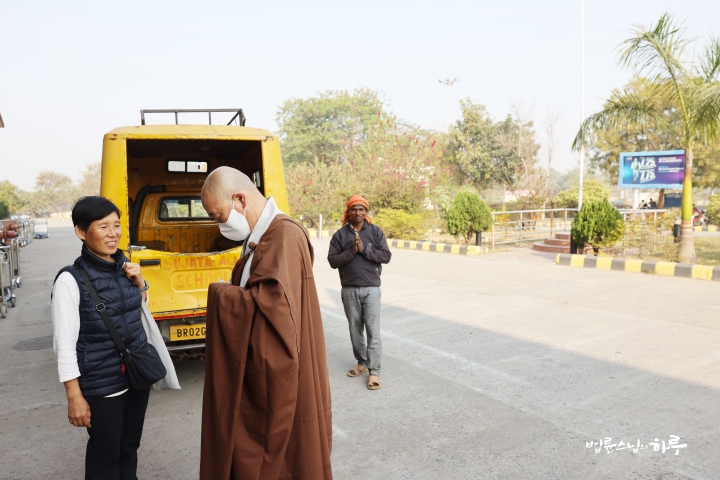
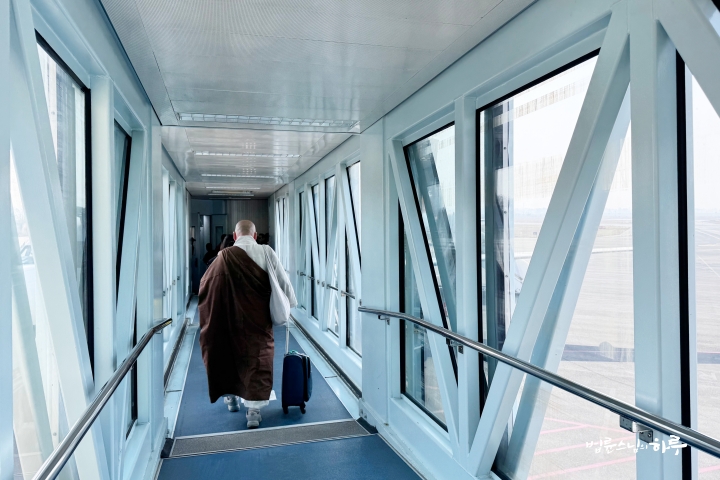
At 11 AM, the plane took off. As we neared Bhutan, the towering, snow-capped peaks of the Himalayas came into view outside the window.
“The sky is clear today, so we can see the snow-capped mountains well.”
Sunim also captured the majestic snow-capped mountains under the clear sky in photographs.

We arrived at Paro Airport at 12:40 PM. Although the departure was delayed by about an hour, we arrived earlier than expected and were able to pass through immigration quickly. Yeshi from the central government was waiting to greet us at the airport.
“Welcome, Sunim. How was your pilgrimage?”
“Yes, the pilgrimage went well. How have you been, Yeshi?” 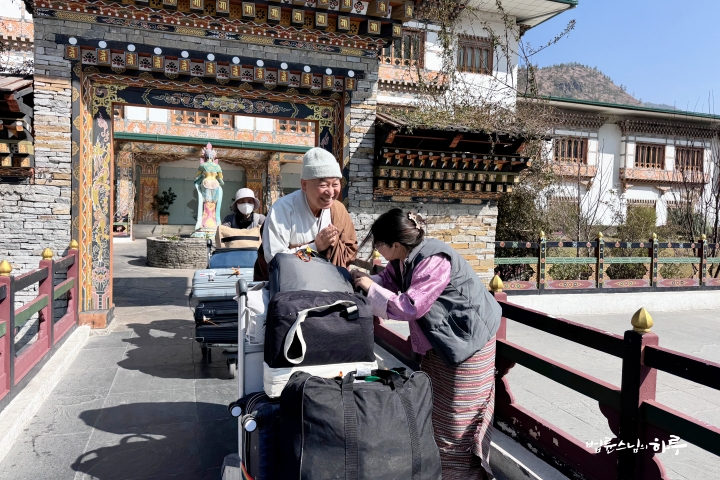
At 1 PM, we left the airport and arrived in Thimphu after about an hour’s drive. In Thimphu, Rinchen Dawa, who was in charge of interpretation, was waiting for us.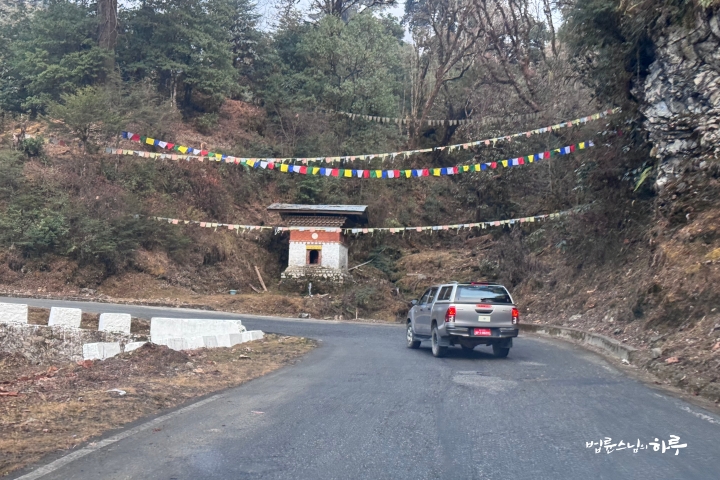
“Rinchen, I thought you wouldn’t be able to come due to family matters. Thank you for coming. Thanks to you, the Trongsa site visit will be much smoother. Is the baby and mother both doing well?”
“Yes, Sunim. Thank you for checking in on us.”
The group joining Sunim for a 10-day journey in Bhutan greeted each other warmly. Then we set off for our destination, Nabji Chiok in Trongsa. We have about a 10-hour drive ahead.
Since the drivers hadn’t had lunch yet, we stopped at a restaurant along the way for a quick dumpling meal before continuing our journey.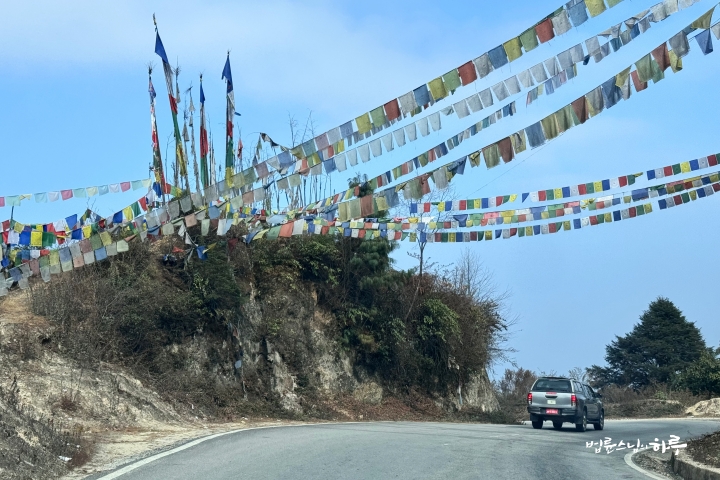
As the sun set, we arrived in Trongsa at 7 PM. We stopped at a restaurant for a quick dinner, and after Sunim briefly reviewed some manuscripts, we continued on to Nabji Chiok.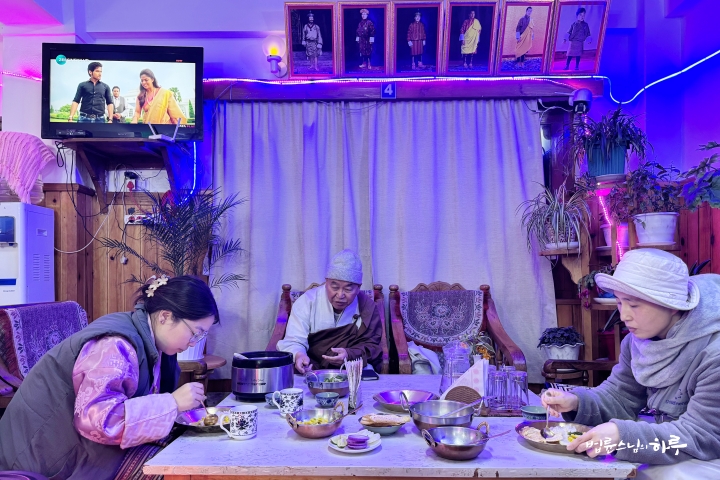
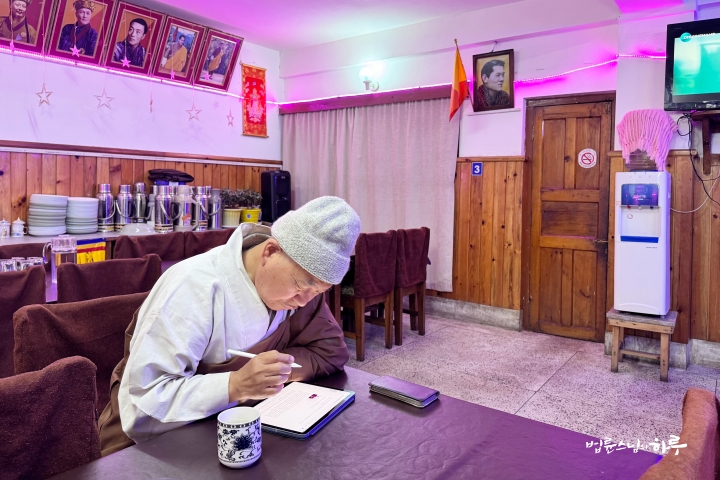
We arrived at our destination, Nabji Chiok, at 10:20 PM. The Trongsa planning officer, Nabji Tshogpa, and JTS volunteers warmly welcomed us.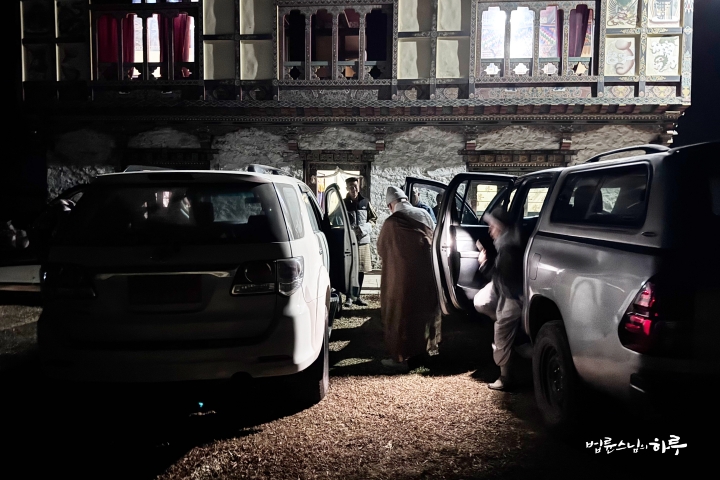
“Welcome, Sunim.”
“Have you all been well?”
“Yes.”
After unpacking at the lodging, Sunim enjoyed a warm cup of tea prepared by the host and discussed the field visit schedule and key things to review with Park Ji-hyun, the local manager.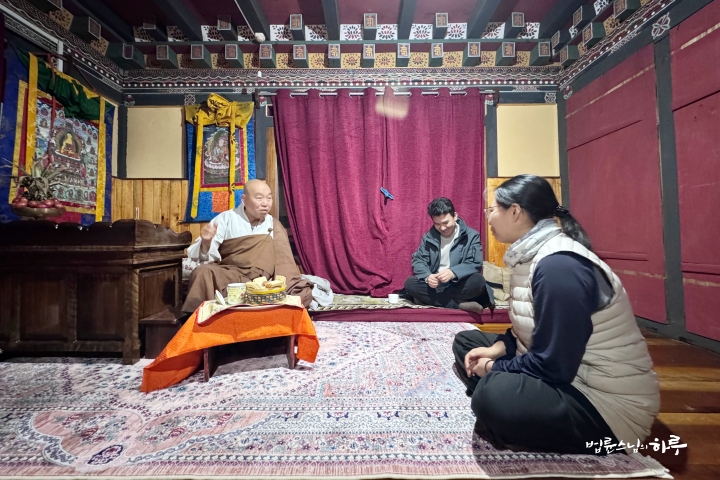
After the discussion, although tired from traveling all day, Sunim finished reviewing the manuscript before going to bed.
Now, the field visit in Trongsa, Bhutan, officially begins. Tomorrow, Sunim will have discussions with the residents of Nabji Chiok along with agricultural experts invited from Korea. Afterward, the experts will stay in Nabji to provide organic farming education to the residents, while Sunim will visit Langthel Gewog.
As there was no Dharma talk today, we’ll share a conversation between a questioner and Sunim from the Friday Dharma Q&A on the 31st.
Since Living With My Mother-in-Law, Conflicts Have Increased. Should We Move Out?
“Did you move into your mother-in-law’s house? Or did she move into your house?”
“We moved into my mother-in-law’s house.”
“Wouldn’t that be like moving into a stranger’s home? If you had lived with just your immediate family, you would have had separate housing costs, but since you moved into your mother-in-law’s house, you’re saving on expenses. In that case, you shouldn’t just see her as your mother-in-law, but treat her respectfully as the homeowner. Do you currently have a job?”
“Yes, I do.”
“If you’re going to work, you’ll need someone to look after the children. You appreciate your mother-in-law looking after the kids, but you don’t like her nagging, right? That’s the wrong way to look at it. You’re receiving the benefit of living in your mother-in-law’s house and the grace of her taking care of your children. So no matter what she says, if you just respond, ‘Yes, I understand, mother,’ ‘I’ll do that,’ there won’t be any problems. If you don’t want to do that, you can just move out.
If you can’t afford to buy a house, you’ll have to pay rent, and you’ll need someone to look after the children, so your expenses will increase. If you think it’s better to live with just your family even if it’s a bit harder, you can do that. But if you move out, you won’t have your mother-in-law’s nagging, but you might struggle again with economic difficulties and additional work. Right now, it’s economically efficient because two households are living together. Instead, there’s conflict because two households are living together. If you don’t like the conflict, you have to accept the economic difficulties, and if you don’t like the economic difficulties, you have to accept that level of conflict. If you’re living rent-free in a house that would normally cost about 500,000 won in rent, you should live with gratitude for the few words of nagging from the homeowner. Every time you hear nagging, think, ‘That’s 30,000 won per nagging.’ And it’s also grateful that she’s taking care of your children.
With this perspective, there’s no problem living with your mother-in-law. Even if you decide to move out, you should clearly understand this point. Don’t think you’re moving out because your mother-in-law is the problem. Right now, two independent households are living in one house. However, your mother-in-law might think of it as one household because she used to live with her son in the same house. The issue began when the daughter-in-law moved in. Your husband and mother-in-law originally lived in the same household. Your husband also considers his mother as part of the same household. He is in one household with you now, but he was once in a household with his mother. On the other hand, you see it as two separate households. You feel like your mother-in-law is a guest in the home you share with your husband and children.
Looking beyond the relationship of mother-in-law and daughter-in-law, she’s a kind person who provides a room and takes care of the children. That’s why you should live saying ‘thank you.’ Also, don’t be jealous if your husband and mother-in-law are close. It’s a mother-son relationship. No matter what happens, you should act with the relationship between your husband and mother-in-law as the priority. If you have this perspective, there’s no problem living with your mother-in-law. In reality, living together benefits you more.
In my opinion, it seems wise to gain benefits while trying to please your mother-in-law a bit. If you think, ‘I don’t want money, I don’t want my mother-in-law to help with childcare, I just want to live with my family,’ then you can discuss it with your husband and move out even tomorrow. Originally, you were separate households, and you moved into your mother-in-law’s house, so there’s no need to talk about moving out. Your family can just leave that house. What do you think would be better?”
“I can’t afford to move out right now, so I guess I have to stay and try to keep my mother-in-law happy.”
“You were considering whether to move out or not when you’re not even in a position to do so immediately? That’s the wrong way of thinking. In such a situation, you shouldn’t be questioning your relationship with your mother-in-law, but living with unconditional gratitude, saying ‘Thank you for providing a room,’ ‘Thank you even more for taking care of the children.’ Don’t think of her as your mother-in-law, think of her as the homeowner. If you want to leave that house, you should do so when you’re financially able. You’re talking as if you have the freedom to decide, ‘Should I leave or stay?’ when you’re not even capable of living independently.
“Would it be okay to move out later once I’m more financially stable?”
“Of course. Originally, you were two separate households. Living separately is natural. But there’s one thing you must keep in mind. Since you can’t afford to live on your own, you shouldn’t be raising your voice while living in your mother-in-law’s house. Even if you and your husband live independently and your widowed mother-in-law wants to live in her son’s house while taking care of her grandchildren, you should take good care of her because she’s looking after the children. To be blunt, complaining while living in your mother-in-law’s house might come across as a bit arrogant. That’s behavior that shows a lack of awareness of your situation. You’re not a criminal, but you should always recognize that you’re in a situation to receive benefits from your mother-in-law and think, ‘Mother-in-law, thank you for looking after the children and providing a room.’ No matter what your mother-in-law says, don’t refuse or question, just live saying, ‘Yes, I understand, mother-in-law.’ Don’t respond to anything, just live saying only two things: ‘Thank you’ and ‘I’m sorry.’ Then there won’t be any issues.”
“But sometimes I feel resentment towards my mother-in-law.”
“That’s like grumbling ‘Should I quit my job or not?’ just because your boss at the company said something. You shouldn’t think like that when you have nowhere else to go if you quit that company. You should only think like that when you’re in a situation to easily go to another company. For now, don’t think about anything else, just live saying ‘Mother-in-law, thank you.’ This way, it’s good for the children, good for your marriage, and good for your relationship with your mother-in-law.”
“Yes, thank you. I really appreciate it.”





